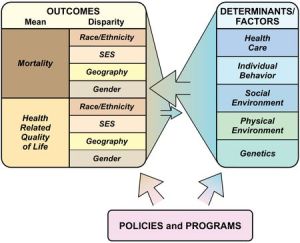This week I ran into this article about the use of Geo-Spacial Tools for Anaylzing Population Health. This demonstrated the potential of using mapping technology that can be over-laid with various healthcare data. I also remembered that social work colleague Samantha Teixeira did similar work with how social workers can use this technology for research. These two articles got me thinking about population health, what it means, and how social work should play a role.
I like to mix it up with the healthcare crowd on social media and have been hearing about population health for a while. In looking in the definition of population health, it can’t truly happen without social work values.
Defining Population Health is tricky. It was interesting to explore a variety of definitions but to keep things fairly simple I will borrow parts for the Wikipedia definition… “the health outcomes of a group of individuals, including the distribution of such outcomes within the group”. Within subgroups one starts find variation and health disparities. Population Health shifts the focus from looking at individuals but to groups. This image via the ImprovingPopulationHealth.org captures the complexity of this definition well…

Taking a glance at this one can see why this relevant to social work. But does population health know how relevant social work is to it?
For those knowledgeable about population health but not social work, the “Social Work Core Values” are a great home base for our profession. They can be found in the preamble the National Association of Social Workers “Code of Ethics”. The core social work values are service, social justice, dignity and worth of a person, importance of human relationship, integrity, and competence fit well with population health.
Service– In service to others we have a deep understanding of connecting determinants to the outcomes. Service provides a “boots on the ground” view and how to intervene. It is about finding ways to make a direct impact on the social determinants of health.
Social Justice – In looking at the disparities in healthcare this is clearly a social justice issue. Social work recognizes that huge gaps in access to services exist. This is one of the hallmarks of the social work profession. To close the gap between the “haves” and “have nots”. To ensure that everyone who has the right to healthcare service, receives it.
Dignity and Worth – In order to move population health forward one should start that everyone is worth something. No matter where you stand in social status, everyone should be treated with dignity and respect.
Importance of Human Relationships– In moving from individual health to population health one has to increase the scale of intervention. You are not only looking at one person but you are looking a families, groups, and communities. Social work excels at this.
Integrity– Population health must be addressed in a manner that is honest and fair. One can’t just say you are “doing population health” you have to follow through with action.
Competence– The above factors must be addressed in a clear and concise manner. One that demonstrates an evidence base and outcomes. Social work is equipped to take this from all angles especially developing policies that can move this forward.
So if you are a social worker that has not heard of population health, glad I could introduce you. More importantly if you are a facility working on population health, make sure you have a social worker on your side. Our training and core values prepares us well to move this mission forward.